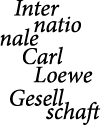Sheet music
Original sheet music prints of ballads from Loewe's time, first and early printings of his instrumental compositions, and anthologies from after 1900 are a treasure trove for music lovers.
This collection contains single sheets and first printed music from Loewe's lifetime, the 17-volume complete edition of the ballads, legends, songs and chants for a singing voice as well as Loewe albums from various publishers from the years after 1900. In addition, original early prints of some of the 17 Loewe oratorios, e.g. B. “The Festival Times”, “Gutenberg”, “The Destruction of Jerusalem” or “The Raising of Lazarus”. Sheet music for Loewe's instrumental works, such as the Grand Trio (Op 12), Quartor spirituale (Op 16) and the Scottish Pictures (Op. 112) complete the collection.
Sheet music for individual ballads
All of the sheet music in the collection was published by different publishers, usually in the three voice ranges high/medium/low, usually during Carl Loewe's lifetime.
Most of the original sheet music comes from a donation in 2012 from the estate of the Stettin merchant Georg Vollbrecht.
Collected works and sheet music albums
After Carl Loewe's death, Dr. Maximilian Runze (1849-1931, among others a student of Carl Loewe at the Stettin Marienstift, the 17-volume complete edition of the ballads, legends, songs and songs for a singing voice, prepared on behalf of the Loewe family between 1899 and 1904. This complete edition was by Breitkopf & Härtel publishing house published in Leipzig.
In the years after 1910, “Loewe albums” with a targeted selection of ballads and songs were published by various publishers.
Oratorios
Loewe worked on the oratorio genre between 1821 and 1864. He composed most of his 18 oratorios based on texts by his friend and colleague at the Stettin high school, Ludwig Giesebrecht. Both had a similar inclination towards church material such as: B. Legends of saints. Despite the general criticism of the approach of some of Loewe's oratorios to opera, several of his oratorios were widely successful with audiences.
Instrumental works
Carl Loewe composed two symphonies, several piano works and other instrumental music. The fact that, despite the enormous workload in his many positions in Stettin, he also dedicated himself to this genre in addition to the more successful ballad compositions speaks for the diverse interests of the exceptional musician Loewe.
The ICLG promotes the revival through research into the sheet music and through its own new arrangements.


